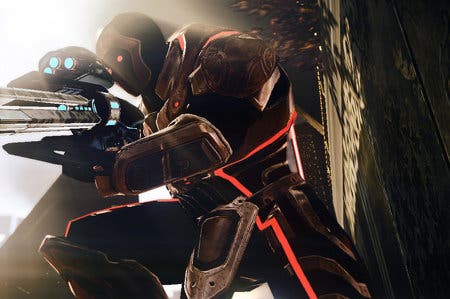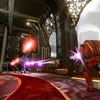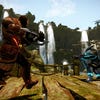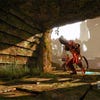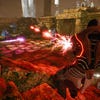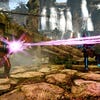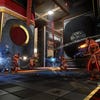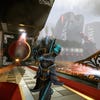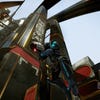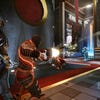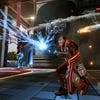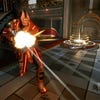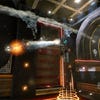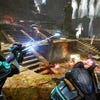Nexuiz Review
You can't go back.
Nostalgia is a comfortable trap, baited with the warm, fuzzy memories of a more innocent time when your mind was less bogged down with adult concerns, when simple pleasures were all you needed. It's a trap Nexuiz falls into almost immediately - and, for all its rudimentary charms, one it struggles to escape.
It seems strange to be pining for a multiplayer buzz when the landscape is strewn with first-person shooters clamouring for your attention, but Nexuiz taps into a neglected sub-genre in search of its fix: the arena shooter. With Unreal Tournament missing in action, and the rest of the pack chasing Call of Duty's cordite-scented tail, there's clearly a small gap in the market for an experience built on nothing more fancy than old-fashioned cat-and-mouse carnage.
Nexuiz, as it happens, has better credentials than you might expect. It's the commercial incarnation of an open-source PC game, itself based on a Quake mod, that's been building an enthusiastic community since 2005. Sadly, in crossing the hardware divide and picking up a price tag in the process, it's lost a lot of its charm and left its indie roots clumsily exposed.
For your 800 Microsoft Points you get nine maps, divided between two game modes. Three maps are available for Capture the Flag games, the remaining six for Team Deathmatch. Four-on-four is the largest lobby the game can accommodate, and matches unfold in brisk, 10-minute bursts.
At its core, Nexuiz is built on a solid bedrock of old-school action. No reloading, no sprint buttons or cover - just frictionless movement, springy rocket-jumping and the relentless rise and fall of the kill/death ratio to worry about. And, for a while at least, it's a refreshing change of pace compared to the feature-creep of the modern shooter.
It doesn't take long for the basic pleasures to run dry, however. The nine weapons on offer are a feeble selection, with little impact and sketchily explained benefits. Each has two fire modes, but few feel essential. You respawn every time with a beefy shotgun, and with gameplay that never evolves, that proves ample for most encounters. This is a game where you can hit someone square in the face with a mortar and have them skitter away, only to finish you off with one hit from the default weapon.
The maps are functional but rarely inspired. Some are tight and claustrophobic, channelling the action through obvious routes. Others sprawl, vertically and horizontally, full of dead ends, fatal drops and bounce pads, taking up more real estate than necessary for a game with so few players. CryEngine 3 gives everything an appealing HD sheen, but overly busy textures and fiddly layouts make these rat-runs seem even more cluttered and confusing than they really are.
There are over 100 mutators to unlock, ranging from the obvious to the ridiculous. Recharging health provides a practical benefit, but clunky jetpacks add little of value. Fart noises and other bizarre touches give it an adolescent sense of fun, but ultimately serve to weigh the game down. Points earned in matches accumulate into "pips" which can then be spent on upgrading these mutators, but the benefit of this is never explained anywhere. There's a scrappy, thrown-together feel to much of the game's structure that irritates as much as it charms.
This is a game style that promotes fast, instinctive action, yet too many features here require laborious research in amongst the crude menus. You want to be able to skate over a pick-up or select a mutator and instantly know what it is, allowing for tactical decisions on the fly. Instead, you get Kinder Egg game design, dashing about on a sugar high, hoping you get something decent at random. Fun in small doses, but a poor foundation for the sort of long-term appeal this genre demands.
That appeal is further eroded by bare-bones online implementation that allows for almost no deep match customisation and leaves players hanging in lobbies waiting for slots to fill and matches to start. This won't be a problem when the servers are busy, or if you have seven friends who want to play. But it doesn't bode well for the future as players drift back to their shooter of choice. Nexuiz requires a community, and there's just nothing here that seems likely to build one. Adding insult to injury, host migration is distracting and sometimes even match-breaking.
It all adds up to shallow pleasure that quickly gives way to a litany of niggling frustrations. Nexuiz is fine with the broad strokes, thanks largely to a tried-and-trusted style of gameplay that is inherently appealing, but it's in the nuance and details that it really comes unstuck. Looking to the past for inspiration is a worthy enough goal in itself, but there's a big difference between updating a good idea and simply resuscitating it. Nexuiz leans too heavily on residual player goodwill, built up by older and better titles, but doesn't add enough fresh ideas of its own to escape those warm, fuzzy shackles of nostalgic indulgence.
